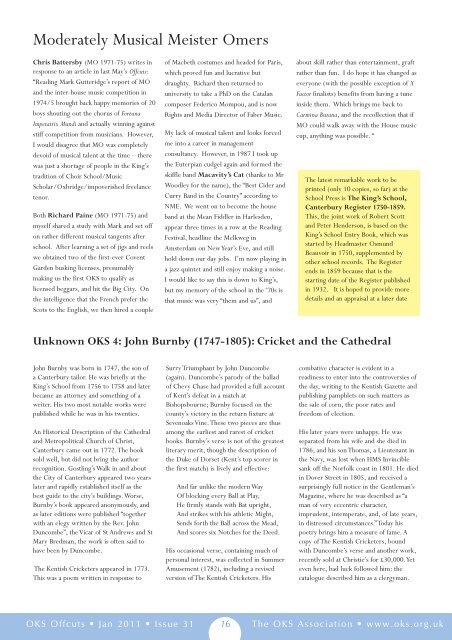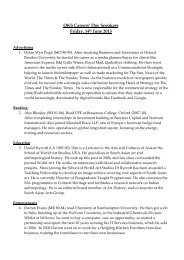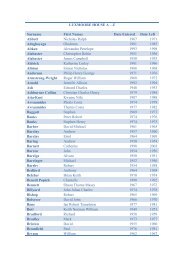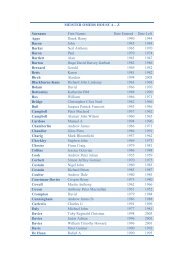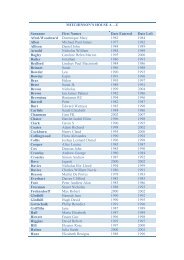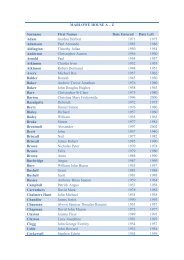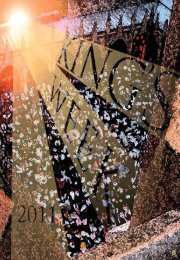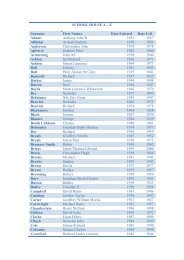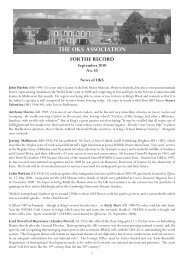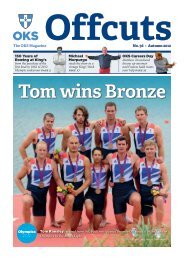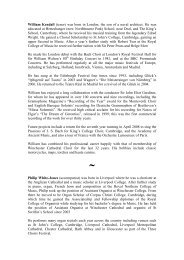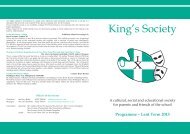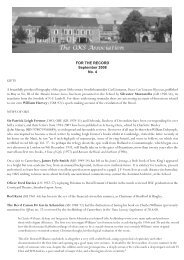January 2011 offcuts_Jan Offcuts 2010.qxd.qxd - The OKS Association
January 2011 offcuts_Jan Offcuts 2010.qxd.qxd - The OKS Association
January 2011 offcuts_Jan Offcuts 2010.qxd.qxd - The OKS Association
Create successful ePaper yourself
Turn your PDF publications into a flip-book with our unique Google optimized e-Paper software.
Moderately Musical Meister Omers<br />
Chris Battersby (MO 1971-75) writes in<br />
response to an article in last May’s <strong>Offcuts</strong>:<br />
“Reading Mark Gutteridge’s report of MO<br />
and the inter-house music competition in<br />
1974/5 brought back happy memories of 20<br />
boys shouting out the chorus of Fortuna<br />
Imperatrix Mundi and actually winning against<br />
stiff competition from musicians. However,<br />
I would disagree that MO was completely<br />
devoid of musical talent at the time – there<br />
was just a shortage of people in the King’s<br />
tradition of Choir School/Music<br />
Scholar/Oxbridge/impoverished freelance<br />
tenor.<br />
Both Richard Paine (MO 1971-75) and<br />
myself shared a study with Mark and set off<br />
on rather different musical tangents after<br />
school. After learning a set of jigs and reels<br />
we obtained two of the first-ever Covent<br />
Garden busking licenses, presumably<br />
making us the first <strong>OKS</strong> to qualify as<br />
licensed beggars, and hit the Big City. On<br />
the intelligence that the French prefer the<br />
Scots to the English, we then hired a couple<br />
of Macbeth costumes and headed for Paris,<br />
which proved fun and lucrative but<br />
draughty. Richard then returned to<br />
university to take a PhD on the Catalan<br />
composer Federico Mompou, and is now<br />
Rights and Media Director of Faber Music.<br />
My lack of musical talent and looks forced<br />
me into a career in management<br />
consultancy. However, in 1987 I took up<br />
the Euterpian cudgel again and formed the<br />
skiffle band Macavity’s Cat (thanks to Mr<br />
Woodley for the name), the “Best Cider and<br />
Curry Band in the Country” according to<br />
NME. We went on to become the house<br />
band at the Mean Fiddler in Harlesden,<br />
appear three times in a row at the Reading<br />
Festival, headline the Melkweg in<br />
Amsterdam on New Year’s Eve, and still<br />
hold down our day jobs. I’m now playing in<br />
a jazz quintet and still enjoy making a noise.<br />
I would like to say this is down to King’s,<br />
but my memory of the school in the ‘70s is<br />
that music was very “them and us”, and<br />
about skill rather than entertainment, graft<br />
rather than fun. I do hope it has changed as<br />
everyone (with the possible exception of X<br />
Factor finalists) benefits from having a tune<br />
inside them. Which brings me back to<br />
Carmina Burana, and the recollection that if<br />
MO could walk away with the House music<br />
cup, anything was possible. “<br />
<strong>The</strong> latest remarkable work to be<br />
printed (only 10 copies, so far) at the<br />
School Press is <strong>The</strong> King’s School,<br />
Canterbury Register 1750-1859.<br />
This, the joint work of Robert Scott<br />
and Peter Henderson, is based on the<br />
King’s School Entry Book, which was<br />
started by Headmaster Osmund<br />
Beauvoir in 1750, supplemented by<br />
other school records. <strong>The</strong> Register<br />
ends in 1859 because that is the<br />
starting date of the Register published<br />
in 1932. It is hoped to provide more<br />
details and an appraisal at a later date<br />
Unknown <strong>OKS</strong> 4: John Burnby (1747-1805): Cricket and the Cathedral<br />
John Burnby was born in 1747, the son of<br />
a Canterbury tailor. He was briefly at the<br />
King’s School from 1756 to 1758 and later<br />
became an attorney and something of a<br />
writer. His two most notable works were<br />
published while he was in his twenties.<br />
An Historical Description of the Cathedral<br />
and Metropolitical Church of Christ,<br />
Canterbury came out in 1772. <strong>The</strong> book<br />
sold well, but did not bring the author<br />
recognition. Gostling’s Walk in and about<br />
the City of Canterbury appeared two years<br />
later and rapidly established itself as the<br />
best guide to the city’s buildings. Worse,<br />
Burnby’s book appeared anonymously, and<br />
as later editions were published “together<br />
with an elegy written by the Rev. John<br />
Duncombe”, the Vicar of St Andrews and St<br />
Mary Bredman, the work is often said to<br />
have been by Duncombe.<br />
<strong>The</strong> Kentish Cricketers appeared in 1773.<br />
This was a poem written in response to<br />
Surry Triumphant by John Duncombe<br />
(again). Duncombe’s parody of the ballad<br />
of Chevy Chase had provided a full account<br />
of Kent’s defeat in a match at<br />
Bishopsbourne; Burnby focused on the<br />
county’s victory in the return fixture at<br />
Sevenoaks Vine. <strong>The</strong>se two pieces are thus<br />
among the earliest and rarest of cricket<br />
books. Burnby’s verse is not of the greatest<br />
literary merit, though the description of<br />
the Duke of Dorset (Kent’s top scorer in<br />
the first match) is lively and effective:<br />
And far unlike the modern Way<br />
Of blocking every Ball at Play,<br />
He firmly stands with Bat upright,<br />
And strikes with his athletic Might,<br />
Sends forth the Ball across the Mead,<br />
And scores six Notches for the Deed.<br />
His occasional verse, containing much of<br />
personal interest, was collected in Summer<br />
Amusement (1782), including a revised<br />
version of <strong>The</strong> Kentish Cricketers. His<br />
combative character is evident in a<br />
readiness to enter into the controversies of<br />
the day, writing to the Kentish Gazette and<br />
publishing pamphlets on such matters as<br />
the sale of corn, the poor rates and<br />
freedom of election.<br />
His later years were unhappy. He was<br />
separated from his wife and she died in<br />
1786, and his son Thomas, a Lieutenant in<br />
the Navy, was lost when HMS Invincible<br />
sank off the Norfolk coast in 1801. He died<br />
in Dover Street in 1805, and received a<br />
surprisingly full notice in the Gentleman’s<br />
Magazine, where he was described as “a<br />
man of very eccentric character,<br />
imprudent, intemperate, and, of late years,<br />
in distressed circumstances.” Today his<br />
poetry brings him a measure of fame. A<br />
copy of <strong>The</strong> Kentish Cricketers, bound<br />
with Duncombe’s verse and another work,<br />
recently sold at Christie’s for £30,000. Yet<br />
even here, bad luck followed him: the<br />
catalogue described him as a clergyman.<br />
<strong>OKS</strong> <strong>Offcuts</strong> • <strong>Jan</strong> <strong>2011</strong> • Issue 31<br />
16<br />
<strong>The</strong> <strong>OKS</strong> <strong>Association</strong> • www.oks.org.uk


